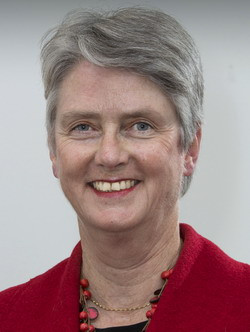A two-dollar oral dextrose gel that has revolutionised the treatment of newborns with low blood sugar has contributed to Distinguished Professor Jane Harding being recognised at New Zealand’s most prestigious research awards.
Professor Harding from the University of Auckland’s Liggins Institute has received the Health Research Council of New Zealand (HRC) Beaven Medal for excellence in translational health research at the Royal Society of New Zealand’s Research Honours Dinner in Christchurch this evening.
Low blood sugar levels in babies are common in the first few days after birth. About 30 per cent of New Zealand babies – or 21,000 babies a year – need testing for low blood sugar under current guidelines. Half of these babies will develop low blood sugar, which can sometimes cause brain damage, and 10 per cent will need to be admitted to a neonatal intensive care unit (NICU) at a cost of about $9.4 million a year.
Professor Harding and her team’s trial of 400 babies born at Waikato Hospital at risk of low blood sugar was published in the Lancet in 2013. Known as the Sugar Babies Study, it was the first study to show that dextrose gel massaged into the inside of a baby’s cheek is more effective than feeding alone for treating low blood sugar. A follow up study of these babies at 2 years of age confirmed that the treatment was safe in the longer term.
HRC Chief Executive Professor Kath McPherson says that Professor Harding’s groundbreaking research is expected to change the way that millions of babies are monitored and treated for this condition around the world.
“Jane and her team’s research has led to the development of a new, simple, safe and inexpensive treatment that significantly reduces healthcare costs by keeping babies out of NICU. It also helps keep mothers and babies together at a critical time for bonding, while supporting breast feeding and its associated benefits for later health and development,” says Professor McPherson.
“Since 2009, Jane and her team have published 17 high impact papers relating to low blood sugar levels in babies. These papers have covered the whole spectrum of translational research, from fundamental research, translation to humans, patients, practice, and finally to population health – a rare feat for a research team.”
A national survey has shown that 75 per cent of birthing units in New Zealand are now using oral dextrose gel to treat low blood sugar levels, and they are reporting a decrease in the number of babies admitted to NICU for this condition. Similar reports are appearing around the world, including in the UK, Australia, and the US.
Professor Harding says the HRC’s Beaven Medal is “great recognition of a multidisciplinary team approach with a resolute focus on how we can make a difference to babies”.
“We’ve tackled many different aspects of the diagnosis and management of low blood sugar levels in babies over the years, and developed several world-first techniques for assessing newborns and pre-school children as a result,” says Professor Harding.
“Low blood sugar is a common problem that should be readily preventable and treatable if we knew more about which babies require what treatment. It’s also an area with a lot of potential to make a difference to babies and their families for their lifetimes. We’ve got the right team of people to address this problem for the world, and it’s very exciting to be part of that.”
The HRC has been a long-time supporter of Professor Harding’s research. Not content with improving treatment, Professor Harding is currently undertaking two HRC-funded projects to see if dextrose gel can also be used to prevent low blood sugar in newborns. Families with at-risk babies are being recruited from Auckland City, North Shore, Waitakere, Waikato, Tauranga, Whakatane, Hawke’s Bay, Whangarei, and Southland hospitals, with four hospitals in Australia expected to join the project trial in the next few months.
